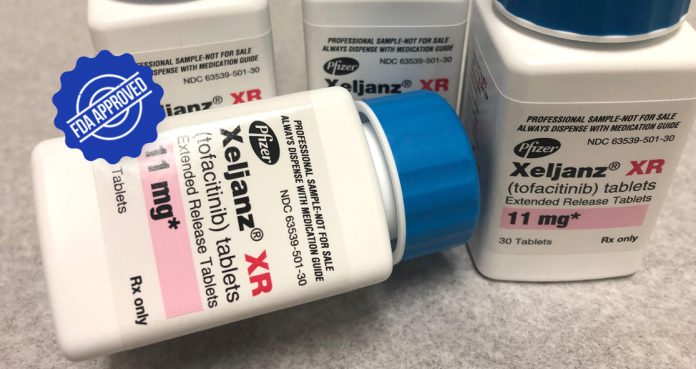The U.S. Food and Drug Administration (FDA) has approved Pfizer’s Xeljanz (tofacitinib) for the treatment of moderately to severely active ulcerative colitis. The drug is approved for the patients with inadequate response or intolerance to tumor necrosis factor inhibitor (TNFi) blockers.
The agency approved Xeljanz extended-release 11 mg and 22 mg tablets for the treatment of the chronic inflammatory condition, which is to be taken once a day. Last year, the drug was approved in 10 mg potency, which is taken twice a day.
Ulcerative colitis is a chronic inflammatory bowel disease characterized by long-lasting inflammation and ulcers in the gastrointestinal system. The symptoms of ulcerative colitis include diarrhea, abdominal pain or cramping, rectal pain or bleeding, an urgency to defecate, weight loss, fatigue, and fever.
There is no cure to this condition; however, some medications are prescribed to manage the signs and symptoms. In the United States, more than 900,000 people are suffering from ulcerative colitis.
Chief Development Officer of Inflammation and Immunology at Pfizer Global Product Development Michael Corbo said, “The symptoms, flares, and complications of ulcerative colitis can affect a patient’s quality of life and be emotionally burdensome. Xeljanz can now be used to remedy those effects of the disease.”
Pfizer said that Xeljanz 10 mg twice a day and 22 mg once a day is the recommended dose for the treatment of ulcerative colitis for a period of 8 to 16 weeks. After that, patients can take Xeljanz 5 mg twice a day or 11 mg once a day.
The pharma giants explained that the drug is contraindicated with biological therapies for ulcerative colitis or along with immunosuppressant drugs such as cyclosporine and azathioprine.
Xeljanz is also prescribed for patients with active rheumatoid arthritis and active psoriatic arthritis. In July, the FDA announced that patients taking Xeljanz 10 mg twice a day for ulcerative colitis are at increased risk of blood clots and of death.





















